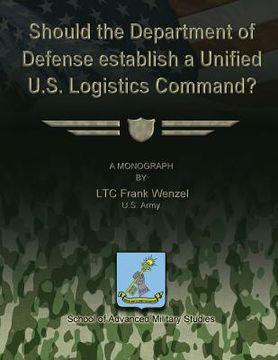Should the Department of Defense Establish a Unified U.S. Logistics Command? (en Inglés)
Reseña del libro "Should the Department of Defense Establish a Unified U.S. Logistics Command? (en Inglés)"
This monograph asserts that DoD should establish a Unified Combatant Command (COCOM)-level USLOGCOM. DoD should begin a deliberate 10-20 year process to establish a USLOGCOM. As an intermediate and immediate step, DoD should make the Defense Logistics Agency (DLA) an operational subordinate command of U.S. Transportation Command (USTRANSCOM). The monograph also makes additional recommendations that work toward an eventual USLOGCOM, including returning the Defense Contract Management Agency to DLA control and placing additional feeding and fueling functions in theater under DLA's control. The monograph relies on the large volume of existing work to arrive at the above recommendation. There is a clear majority of work calling for increased centralization of strategic logistics authorities. These previous studies were done by a wide variety of respected organizations including the Government Accountability Office, the Defense Science Board (DSB), the RAND Corporation, and monographs by graduate students. The DSB points out that recommendations for consolidation are consistent with their 1996, 1998, and 2001 studies on logistics transformation. The report pointedly asks, since these recommendations and the recommendations of other groups are consistent and not new, "Why has none of this been done before?" In an attempt to answer this question, they offer four possible explanations. First, stakeholders have felt no compelling reason (similar to a profit and loss statement in the private sector) to change to a more efficient organizational construct. Second, driven by risk avoidance and diffusion of authority in the logistics systems, decision times are too long. Third, the system is designed to focus on resource allocations principally to the Services rather than to mission priorities. Finally, the report states there is little incentive to use effective metrics to monitor resource utilization and then there is little, if any, consequence for not meeting or even setting targets. DSB points out that DoD has achieved only marginal progress on logistics reform and improvement despite decades focused on logistics reform and improvement. To combat this, they recommend DoD implement a single accountable authority to act as leader. Appointment of USTRANSCOM as the Distribution Process Owner for DoD was an important step. The merger of USTRANSCOM and DLA is a logical progression and is in the intent of the Goldwater-Nichols legislation. U.S. Strategic Command provides valuable insights and a model to follow in making an agency a joint functional component subordinate of an existing COCOM. Two NATO allies have already formed unified logistics organizations. The construct of the unified logistics branch of the German or British military goes well beyond what this monograph recommends, and well beyond any reputable proposal found in research for this monograph. While these allies' experience is not identical to any reputable reorganization proposal for DoD, their experience is relevant as DoD considers a road map for potential strategic logistics reorganization. The monograph prominently includes the perspectives of senior leaders on the question of forming a USLOGCOM. While the metric only includes the above-mentioned historical studies, the flag officer opinions on the topic obviously carry the most weight. These are the senior leaders who will recommend and eventually decide whether a USLOGCOM is formed.

